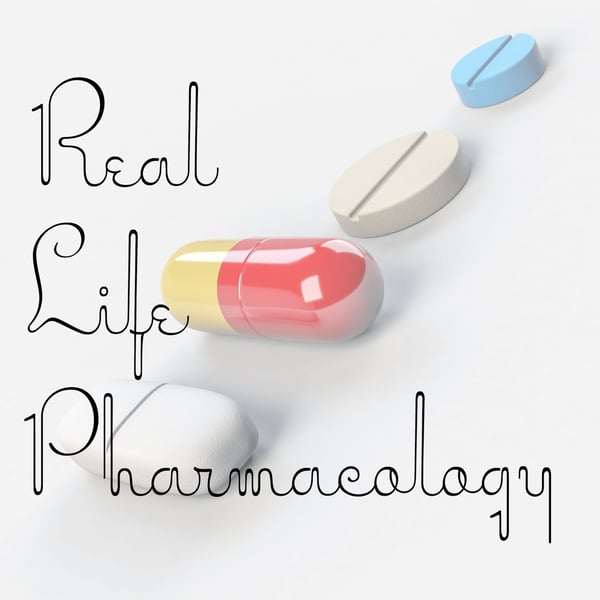Buspirone Pharmacology
Real Life Pharmacology - Pharmacology Education for Health Care Professionals
Eric Christianson, PharmD; Pharmacology Expert and Clinical Pharmacist
5 • 716 Ratings
🗓️ 26 September 2019
⏱️ 13 minutes
🧾️ Download transcript
Summary
Buspirone has a very high first-pass metabolism. This means that the body breaks much of the medication down prior to it getting into the systemic circulation.
Buspirone is broken down by CYP3A4, so concomitant use with inhibitors or inducers can alter its concentrations
Buspirone should not be used as needed as this medication takes a while to start to show benefit.
Transcript
Click on a timestamp to play from that location
| 0:00.0 | Hey all, welcome back to the real-life pharmacology podcast. I'm your host, pharmacist Eric Christensen. |
| 0:07.3 | And today I'm going to be covering buzperone, which the brand name of this medication is Busebar. |
| 0:15.1 | It's generic kind of classification is an anti-anxiety type medication and I would say in clinical practice |
| 0:24.1 | that's probably the most common reason you're going to see this medication |
| 0:28.4 | utilized on occasion I rarely have seen it used for depression as far as |
| 0:36.7 | augmentation and using it with other antidepressant |
| 0:41.0 | agents in patients who are struggling to get those symptoms under control. But I would say that's |
| 0:48.0 | pretty rare there in general. So with busperone, the mechanism of action is really not totally well understood as far as |
| 0:59.8 | its role in managing and helping anxiety symptoms. Now there is some theories, some suggested |
| 1:09.5 | mechanism of actions that we might think that this medication |
| 1:14.3 | works through. So when you think of a medication that might work for depression, might work |
| 1:20.0 | for anxiety, we probably think of serotonergic activity. So that's one of the main mechanisms |
| 1:26.3 | that are educated guess guess or best guess, |
| 1:30.3 | is that it is a partial agonist at 5HT1 receptors, potentially 5HT2 as well. So having that agonist, |
| 1:44.0 | stimulating type activity, you might hypothesize that's the reason |
| 1:49.4 | why we may see some anti-anxiety, anti-depressant type benefit with this medication. |
| 1:58.9 | Now there is one other suggested mechanism that it does have some mild dopamine blocking activity. |
| 2:08.6 | So I'll talk about that a little bit as far as adverse effect profile and kind of a rare situation that you may come up against. |
| 2:18.3 | With dosing, I think one of the bigger downsides with buzprone is that it's got a very short half-life. |
| 2:29.3 | And so this medication is dose generally two to three times per day. |
| 2:38.1 | So in patients where you've got difficulty with adherence, |
| 2:41.4 | maybe a very busy schedule, that type of thing, |
... |
Please login to see the full transcript.
Disclaimer: The podcast and artwork embedded on this page are from Eric Christianson, PharmD; Pharmacology Expert and Clinical Pharmacist, and are the property of its owner and not affiliated with or endorsed by Tapesearch.
Generated transcripts are the property of Eric Christianson, PharmD; Pharmacology Expert and Clinical Pharmacist and are distributed freely under the Fair Use doctrine. Transcripts generated by Tapesearch are not guaranteed to be accurate.
Copyright © Tapesearch 2025.

